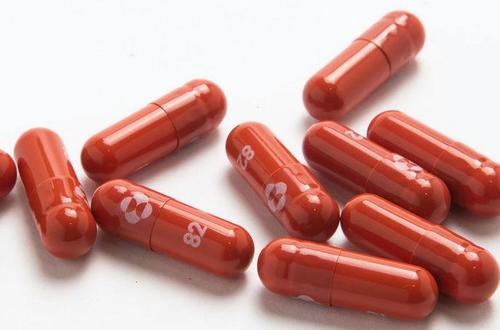posted on
Feb 04, 2022 03:39PM

...We Welcome You To The Resverlogix HUB withIn The AGORACOM COMMUNITY!

Message: Value
Tada, this will give you an idea of the costs:
Merck Charging US 40 Times What It Costs To Make Govt-Financed COVID Pill

by Tyler Durden
Wednesday, Oct 06, 2021 - 06:12 PM
Merck's new 'not Ivermectin' Covid-19 treatment, molnupiravir, costs $17.74 to produce - yet the company is charging the US government $712 for the treatment - a 40x markup, according to The Intercept, citing a report issued last week by the Harvard School of Public Health and King’s College Hospital in London.
 Molnupiravir pill from Merck. Photo: Merck Sharp & Dohme Corp.
Molnupiravir pill from Merck. Photo: Merck Sharp & Dohme Corp.
The pill, originally developed using US government funds as a possible treatment for Venezuelan equine encephalitis, cut the risk of hospitalization and death in half in a randomized trial of 775 adults with mild/moderate Covid who were considered at high risk for disease due to comorbidities such as obesity, diabetes and heart disease. The trial was stopped early so the company could apply for and emergency use authorization (EUA). The drug did not benefit patients who were already hospitalized with severe disease.
News of the oral 'wonder drug' sent shares of Merck higher last week, as the company says it can deliver 10MM doses by the end of the year.
Clearly, the pill could bring in massive profits to Merck and its partner on the drug, Ridgeback Biotherapeutics - which licensed the drug from Emory University in 2020 and then sold the worldwide rights to the drug to Merck for a sum which has not been disclosed.
Meanwhile, the Defense Threat Reduction Agency, a division of the Department of Defense, funded development of the drug by Emory University to the tune of $10 million between 2013 and 2015, according to nonprofit group Knowledge Ecology International discovered.
DTRA-JSTO, under the CBDP, invested in a broad-spectrum #antiviral, leading to the discovery of molnupiravir through collaborative research with @Merck, @EmoryUniversity, #RidgebackBio, & @NIH.
— Defense Threat Reduction Agency (@doddtra) October 1, 2021
This drug has applications against encephalitic alphaviruses, flu, SARS-CoV2, & more. pic.twitter.com/Z9gztSreC2
Yet, as Quartz points out, only Merck and Ridgeback will profit from the new antiviral - which they say "could be one of the most lucrative drugs ever," bringing in as much as $7 billion by the end of this year alone.
Despite its initial investment, the U.S. government seems to be facing a steep markup in prices. In June, the government signed a $1.2 billion contract with Merck to supply 1.7 million courses of the medication at the $712 price. The transaction is due to take place as soon as molnupiravir receives emergency use authorization from the Food and Drug Administration.
Good government advocates are pointing out that because federal agencies spent at least $29 million on the drug’s development, the government has the obligation to ensure that the medicine is affordable. “The public funded this drug, and therefore the public has some rights, including the rights you have it available under reasonable terms,” said Luis Gil Abinader, senior researcher at Knowledge Ecology International. -The Intercept
Pushing back
Ridgeback co-founder Wendy Holman told CNBC in an interview last week that they asked for, but "never got government funding" for the manufacture of molnupiravir. The company also claimed in a press release touting the study that "since licensed by Ridgeback, all funds used for the development of molnupiravir have been provided by Merck and by Wayne and Wendy Holman of Ridgeback."
Critics, meanwhile, say the $700+ price point is absurd - with health advocates concerned that people some countries will not be able to afford the new drug.
"Offering someone a $700 treatment when they don’t yet feel that ill is going to mean that a lot of people are not going to take it," said King's College Hospital physician Dzintars Gotham, co-author of the report - which suggests that Merck would still reap a 10% profit margin if they priced molnupiravir at $19.99.
"If you can’t afford medicine because it’s 1,000 times more than you can afford, or because it’s 100 times more than you can afford, it doesn’t matter," said Melissa Barber, a doctoral candidate at the Harvard School of Public Health and co-author of the report on molnupiravir, adding "those are both bad."
Barber and Gotham acknowledge that the $17.74 cost of producing a five-day course of the antiviral pills is an estimate but said that the algorithm they used, and have employed to estimate the production costs for hundreds of drugs, tends to result in overestimates in the long run.
Meanwhile, the prices that private companies charge for drugs tend to go up rather than down. “For all these deals that have happened for therapeutics or vaccines, the price has only increased as uncertainty has decreased,” she said. “One price is given and then, for the next sale, the price goes up. The price went up for other drugs and vaccines, so I would be very surprised if this price didn’t go up, too.” -The Intercept
5 Recommendations
Loading...
Loading...
New Message
Please
login
to post a reply